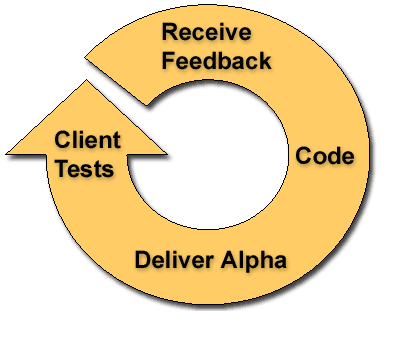A couple years back, a group of us at work put together a series of classes designed to help people better communicate and manage their tasks more efficiently. We present them in a sequence we think makes logical sense: Email Management, Task Management, Setting Deadlines and Following-up, and Better Meetings. There is a common refrain heard during our classes that the material is all fine and good, but people just don’t have time to practice and do all the techniques we discuss. People who try to do these things complain that doing so leaves them no time to get any real work done. They say this as if being busy were excuse enough to avoid these responsibilities, as if responding to emails, managing task priorities, following up on task requests, and properly leading and preparing for meetings were optional things that can be skipped when they are busy. I no longer wonder so many people think sending emails (if no one responds to them), setting priorities (if no one pays attention to them), doing work requested from others (if no one ever checks in to see how things are going), and attending meetings (if no one ever prepares for them) are a waste of time.
While many of us would like to spend all our time doing only that part of our work that we enjoy, whether it be writing software, designing or building new instruments, conducting research, or whatever, few people have that luxury either in their organization or perhaps ever in their own work lives. So, let me say something very unpopular: answering email is real work. Making sure you are working on the most important thing to be working on in any given moment is real work. Following up on tasks you depend on that others are supposed to be doing is real work. Attending meetings is real work. These things are not fake work. They are not pointless tasks that don’t further your organization’s objectives (well, at least they shouldn’t be – more on that later). They are part of the necessary ingredients for running and working within an organization.
Now, all that being said, I do admit that not all emails contain useful information or necessary requests for action, not all tasks on your todo list are of equal importance, and some meetings seem to have no practical purpose, but these examples should be the exception, not the rule. What most treatises on managing your email and tasks and running better meetings leave out, for example, is the first step: eliminate as many unnecessary emails, tasks. and meetings as possible. Try sending less email; you’ll probably get less in return. Pick up the phone if there’s a complicated issue involved rather than sending 12 rounds of email. Call a meeting if many people need to be consulted on a complex issue. Accept new tasks only if you can make the time to devote to them. If a meeting isn’t making a decision, why are you having it?
Eliminate extraneous emails and meetings, but do process the rest fully. This is real work. If you have too many tasks on your plate to manage; too many people to follow-up with, too many meetings to attend, then you probably aren’t getting everything done and you might as well select which tasks aren’t going to get done by purposefully eliminating them from your plate rather than letting random fate dictate what tasks you do and which you don’t. When you’ve prepared yourself a plate of tasks appropriate to your available time, manage those tasks properly; follow-up with others needed to help you complete your tasks and projects. This is necessary work. This is real work.
Recently an attendee from one of our classes asked me if David Allen had any quantitative evidence that regularly emptying your inbox actually made you a better performer at work. Although he had a slightly different point in mind, I responded, in part, as follows:
No, I don’t believe David Allen has any quantitative evidence that emptying your inbox is a good thing. I’ve never seen any, at least. I also don’t think he needs any. Do we need numerical evidence to show that listening to our phone messages is a good thing? That writing down action items assigned to us at a project meeting is a good thing? To me, emptying my inbox is about understanding my tasks and workload; I can then decide, by choice, how to handle each task (do, delegate, delete, file, re-negotiate, etc.) and be confident I am not letting some critical request on my time go unnoticed, lost in my inbox.
The email inbox represents a task list. Some tasks can be dealt with quickly while others take more time. But if we don’t go through that task list and make decisions about which tasks to do and which not to do, we are letting chance dictate which tasks get done and which not, simply depending on which emails we happen to look at. (We also make ourselves uneasy, wondering what we’re missing or forgetting about that’s contained in that inbox.) Emptying our inboxes is not about completing all the tasks that the emails represent, but about getting the tasks out of our inboxes (it’s called an inbox for a reason) and into our task management systems where we can decide when to schedule/do the work. David Allen’s point is that it is just as necessary to process our email inboxes as it is to answer our phones, get our mail, respond when someone knocks on our doors, etc.
What David Allen doesn’t address, is how to minimize the number of potential tasks that come to us via our email inboxes. That is something we tried to include in our classes, though, since we believe it’s a key part of the solution to getting our inboxes under control.
So, if you don’t have time to handle your email properly, manage your tasks and your requests of others sufficiently, attend and lead productive meetings, then the first step is to eliminate clutter from your work life. Cut down on the emails you send, filter emails you know don’t need attention right away, unsubscribe to some mailing lists. Delegate, re-negotiate or reject tasks you aren’t going to get done. Eliminate unnecessary meetings from your schedule. But once you do these things, your work isn’t done unless you manage your emails and tasks, check in with those working on tasks for you, and come prepared to make meetings productive. These tasks are necessary. They are real work. They may not be the most glorious of tasks on your plate, but if you don’t do them, the rest of your real work will likely suffer.
Unfortunately, Scot isn’t perfect, either, in making sure all the necessary non-“real” work gets done in his life, but he has found that when he does do it, things go more smoothly and this has been pretty good motivation to make the time to try to do these things right.


